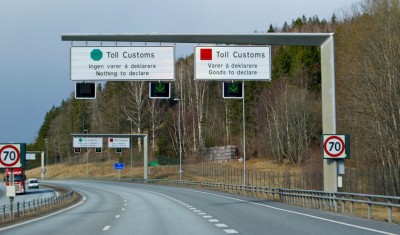New numbers confirm that Norwegians are still heading over the border in droves, to do their grocery shopping and buy other items in countries, mostly Sweden, where taxes and prices are generally much lower than at home. The Norwegian beverage industry is suffering more than ever, and now demands reductions in Norway’s high taxes on both packaging and the drinks themselves.

“The Norwegian beverage industry and trade can’t live with such a huge difference in taxes,” Thomas Angell of industry trade association Virke told news bureau NTB. “There are lots of different taxes and fees that contribute to the difference. Virke will make a priority of getting a basic tax on beverage packaging removed.”
Norway’s state statistic bureau SSB released new figures this week showing that the amount of money Norwegians spent while on day trips over the border increased by NOK 1.43 billion (USD 24 million), to NOK 13.23 billion, during the year ending March 31. That’s up 12.1 percent over the same period the prior year, reported NTB.
The statistics experts also reported that the number of Norwegians’ day trips over the border rose by 16.6 percent, from 6.45 million trips to 7.52 million trips. That indicates that many residents of Norway make a practice of shopping over the border, since Norway has a total population of just over 5 million.
Drinks flowing over the border
According to Virke, Norwegians are steadily bringing more beer and soft drinks back home with them, since they’re much cheaper in Sweden, for example, than in Norway. Virke officials note that a single can of beer can be as much as NOK 8 (USD 1.33) more expensive in Norway because of the difference in taxes on alcoholic drinks and packaging.
Soft drinks in Sweden can also be half their price in Norway, not least because of Norway’s special taxes on cans and plastic bottling plus sugar and carbonation. While there’s still a political majority in Norway on maintaing high taxes on alcoholic beverages, Angell is launching an attack on the packaging taxes (called emballasjeavgifter) that he claims no longer serve any environmental purpose. Packaging drinks in cans and plastic bottles is both less costly and more environmentally friendly now than using glass, but Norway nonetheless collects an estimated NOK 1.35 billion a year on can- and plastic-bottle taxes.
“These taxes don’t improve the environment and rather contribute to weaken Norwegian industry and trade, by luring Norwegians to Swedish shopping centers,” Angell said. His organization is thus asking Norway’s new conservative government to remove the taxes in its next state budget for 2015, due to be proposed this fall.
Shopping centers in such Swedish border towns as Svinesund and Charlottenberg, around a two-hour drive from the Oslo area, have long drawn Norwegian shoppers attracted by cheaper wine, liquor and tobacco. In recent years, Norway’s higher prices on meat, dairy products and other food and household items have led to many Norwegians to routinely do major grocery shopping over the border, also because selection is often much higher.
newsinenglish.no/Nina Berglund

